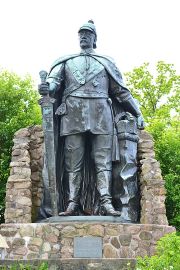|
Home
|
Aug 5, 2024
This week’s themeLoanwords and loan translations This week’s words machtpolitik dogwatch bridgehead earworm immiseration 
Otto von Bismarck, also known as the Iron Chancellor, who used machtpolitik to unify Germany
Photo: Wikimedia Previous week’s theme Minced oaths A.Word.A.Day
with Anu GargA few years ago, Turkish president Erdogan ordered a purging of foreign vocabulary. (The Economist, permalink). You’d think people could choose their own words and let others do the same. But what good is being an autocrat if you can’t dictate what words others use? And, as these things go, in his speech, he slipped and said that foreign words were not “chic”. When two languages meet, sometimes they simply shake hands. But if they continue hanging out together, give-and-take begins to happen. Languages exchange words. We call such a word a loanword. For example, we borrowed pundit from Sanskrit. English itself has borrowed hundreds of words from Turkish, either directly or via other languages. For example: bosh, dervish, irade, janissary, kurbash, pasha, vizier. Sometimes instead of borrowing a word outright, we translate it from its source language to our language. This is called a loan translation. For example, the term paper tiger is a loan translation of Chinese zhi lao hu and the term blue blood is a loan translation of Spanish sangre azul. Once in a while, we make a loan translation and also borrow the original term. For example, the term worldview is a loan translation of German weltanschauung and we have also borrowed the original. This week we’ll feature five loan translations. Do you speak another language? What words from it would you like to loan translate into English? What words from English are common in your language? Share below or email us at words@wordsmith.org. As always, include your location (city, state). And who knows, maybe even President Erdogan would approve of some of these new, freshly loan translated terms. machtpolitik
PRONUNCIATION:
MEANING:
noun: Power politics: policies that advocate the use of power and physical force to attain their goals.
ETYMOLOGY:
From German Machtpolitik (power politics), from Macht (power, strength)
+ Politik (politics, policy). Earliest documented use: 1916. Compare with
realpolitik
USAGE:
“Either the US military will have to intervene in force (including with
substantial ground troops) or we’ll have to ally, in a very un-American
display of machtpolitik, with Bashar Assad.” Ross Douthat; Grand Illusion in Syria; The New York Times; Sep 21, 2014. A THOUGHT FOR TODAY:
Do unto those downstream as you would have those upstream do unto you.
-Wendell Berry, farmer and author (b. 5 Aug 1934)
|
|
Subscriber Services
Awards | Stats | Links | Privacy Policy
Contribute | Advertise
Awards | Stats | Links | Privacy Policy
Contribute | Advertise
© 1994-2025 Wordsmith